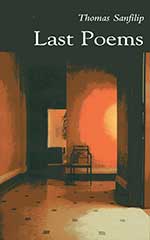
Last Poems
Thomas Sanfilip
ISBN 978-0-9625306-5-4
19.95 pages
Hardcover - Poetry
Price: $19.95
August 2007
A rare display of poetic mastery and stylistic brilliance, this new collection of poetry by Thomas Sanfilip is a unique work of remarkable emotional intensity and spiritual defies categorization. Reminiscent of the fragmented elegies of the ancient Greeks, Last Poems is a riveting monody to the last days of a family in physical and spiritual decline. Shifting between dialogue with his own conscience and inner monologues with each family member, Sanfilip’s voice is at once plaintive and somber, stalwart and unyielding in his effort to reconcile the tragedies that have brought each individually and collectively to despair. At the same time, Sanfilip transforms disillusionment into profound mystical appeals that set out to resolve the disparities between life and death, meaning and self-negation in the light of familial love and its struggle for affirmation. In the end, each family member becomes a distinct archetype that leads the poet to a greater understanding of the tenuous connection we hold to the world, the people closest to us, and to the living substance of the soul in all its tragic beauty.
Midwest Book Review
Last Poems is free-verse poetic tragedy written by widely published poet and author Thomas Sanfilip. Collectively, the many poems tell the sorrowful tale of the final days of a family in physical and spiritual decay. Individually and collectively brought to the depths of despair, each family member speaks out and seeks to reconcile the cruel vagaries of life that have carried them to this point. A mystic element transcending the borders of life and death offers faint solace in this emotional portrayal of the connections between human beings and the essence of the soul. “In a rain of sun showering shadows across earth, / my steps proceed in effortless wind along its edge, / the purity of its presence framing this space / around my soul dusting faded stars, / metaphors retrieved, one foot beyond the other, / the enfant-exuberant remembering their eternal presence.”
